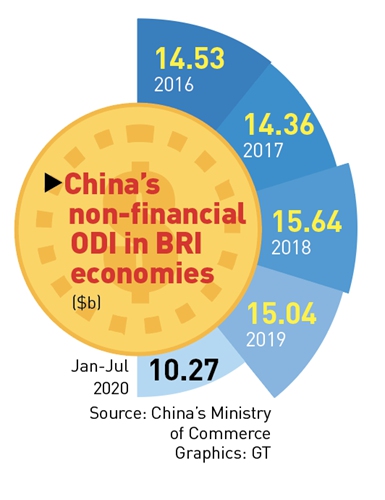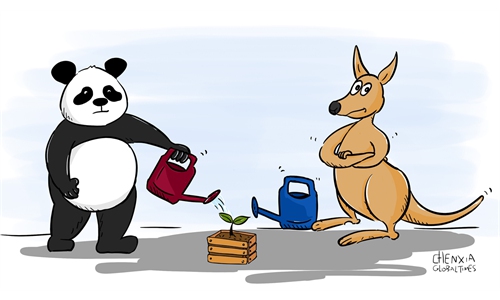Canberra's move to veto BRI deal weighs on its recovery amid virus
Canberra’s move weighs on its recovery amid virus

Photo taken on May 19, 2020 shows the buildings in thick fog in Canberra, Australia. Photo:Xinhua
A move by Australia's federal government to seek new legislation for its "national interests," which will give Canberra the power to veto the Belt and Road Initiative (BRI) deal reached between the state of Victoria and China, could worsen souring bilateral ties, Chinese experts said Thursday.
Beyond that, if the BRI deal is voided by the new law, it will affect Chinese investors' confidence in Australia - and trade too, especially that between China and Victoria, supported by the BRI agreement, is also likely to be affected.
According to a Bloomberg report, Prime Minister Scott Morrison's administration is seeking new legislation that will give Foreign Minister Marise Payne the power to veto or scrap agreements that state governments reached with foreign countries, in a move aimed at weakening China's investment and influence in the nation.
The legislation, which comes amid a downward spiral in bilateral ties, will be introduced next week by the Morrison government, and it is likely to be passed by the end of the year.
Since April when Canberra followed the steps of the US government to pressure China, a series of moves on trade have been taken by each side. These include China's tariffs on Australian barley and Chinese dairy company Mengniu's decision to abandon its purchase plan for Australian company Lion Dairy due to Canberra's opposition.
Song Wei, deputy director of the Institute of International Development Cooperation at the Chinese Academy of International Trade and Economic Cooperation, said that the political motivation of the Morrison government is "quite obvious," as some members of the government are eager to support the US and discriminate China.
"Such a scenario will bring a definite negative impact to bilateral ties and make it hard for the Australian economy to recover amid the ongoing COVID-19 pandemic," Song told the Global Times Thursday.
Song predicted the development will dampen the interest of Chinese investors in the Australian market.

In 2018, Daniel Andrews, the premier of Victoria, signed a memorandum of understanding on BRI cooperation - mostly infrastructure projects - with China, and the two sides signed the deal in 2019. Since then, Andrews has been working hard to defend the deal, despite pressure from the federal government.
China's cooperation with Australia's southeastern Victoria state under the BRI has contributed to the welfare of the two peoples and it is hoped that the Australian side could view the BRI in an objective and reasonable light and stop posing obstacles to normal cooperation, Zhao Lijian, spokesperson of China's Foreign Ministry, said on Thursday.
The BRI plays an active role for the sustainable and fast economic development of Victoria - the most economically developed state in Australia - which has huge need for infrastructure projects such as railways, ports and telecommunications, Yu Lei, chief researcher at the Research Center for Pacific Island Countries with Liaocheng University, told the Global Times Thursday.
"There has not been significant progress on the implementation of the BRI deal so far, but the Victorian government has been pushing forward the deal t, because it knows it would promote its trade with China," Yu noted.
Yu added that if the deal is eventually blocked by the federal government, not only will bilateral ties will be further harmed, but also the trade promoted by the deal with China.
Andrews defended the BRI deal as important for Victorian jobs after the federal government's move, urging Morrison to explain alternative export markets for Victorian goods, the Guardian reported Thursday.
"If the prime minister's got time to be doing those things, then that's fine for him," the premier was quoted as saying. "I don't. I am exclusively focused on fighting this virus and then ensuring we've got the strongest economy that we can possibly have on the other side of this."
As of press time, Andrews' office had not responded to the Global Times' request for comment.
In May, US Secretary of State Mike Pompeo threatened that the US may choose to "disconnect from Australia," alleging American telecoms services may be compromised by Victoria state's BRI cooperation with China.
Chinese analysts said if the deal is scrapped, at the bequest of the US, it will only confirm Australia's status of deputy sheriff of the US and further damage strained diplomatic ties, with economic consequences.
Analysts also pointed out that failing to be involved in the BRI could mean Chinese investment will further drop, as it has already slowed to a trickle. Chinese investment in Australia in US dollar terms fell 62.2 percent during 2018-19 to $2.4 billion, a report by KPMG showed in June.
Countries and regions along the BRI have been absorbing a rising proportion of Chinese overseas direct investment (ODI).
During the first seven months of the year, investment in those economies accounted for 17 percent of total Chinese ODI, a 4.5 percentage point rise from the same period last year, data from China's Ministry of Commerce showed.



